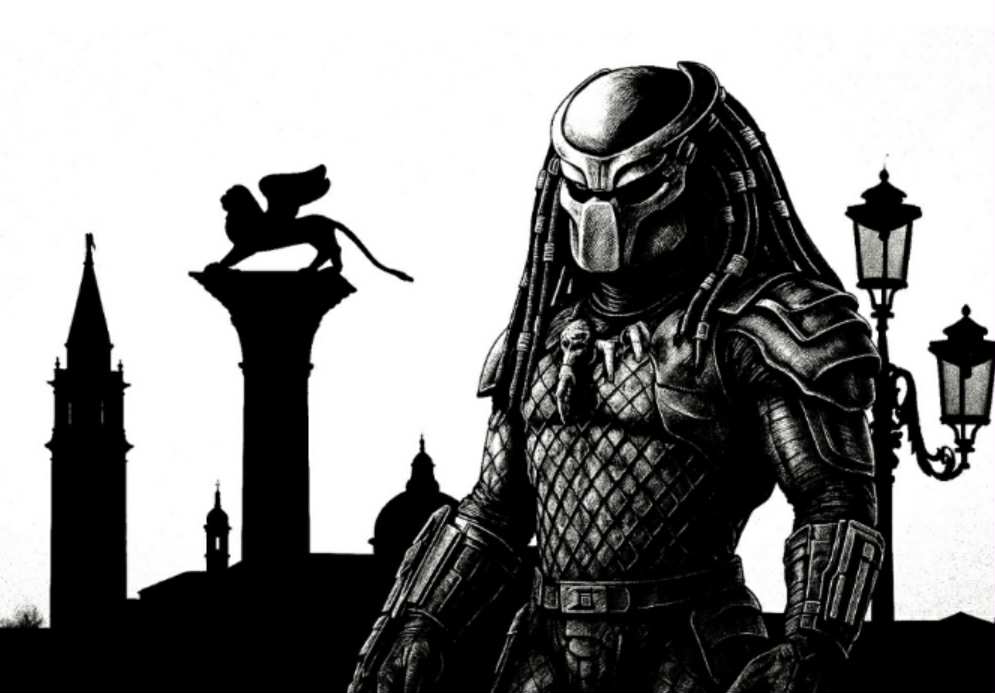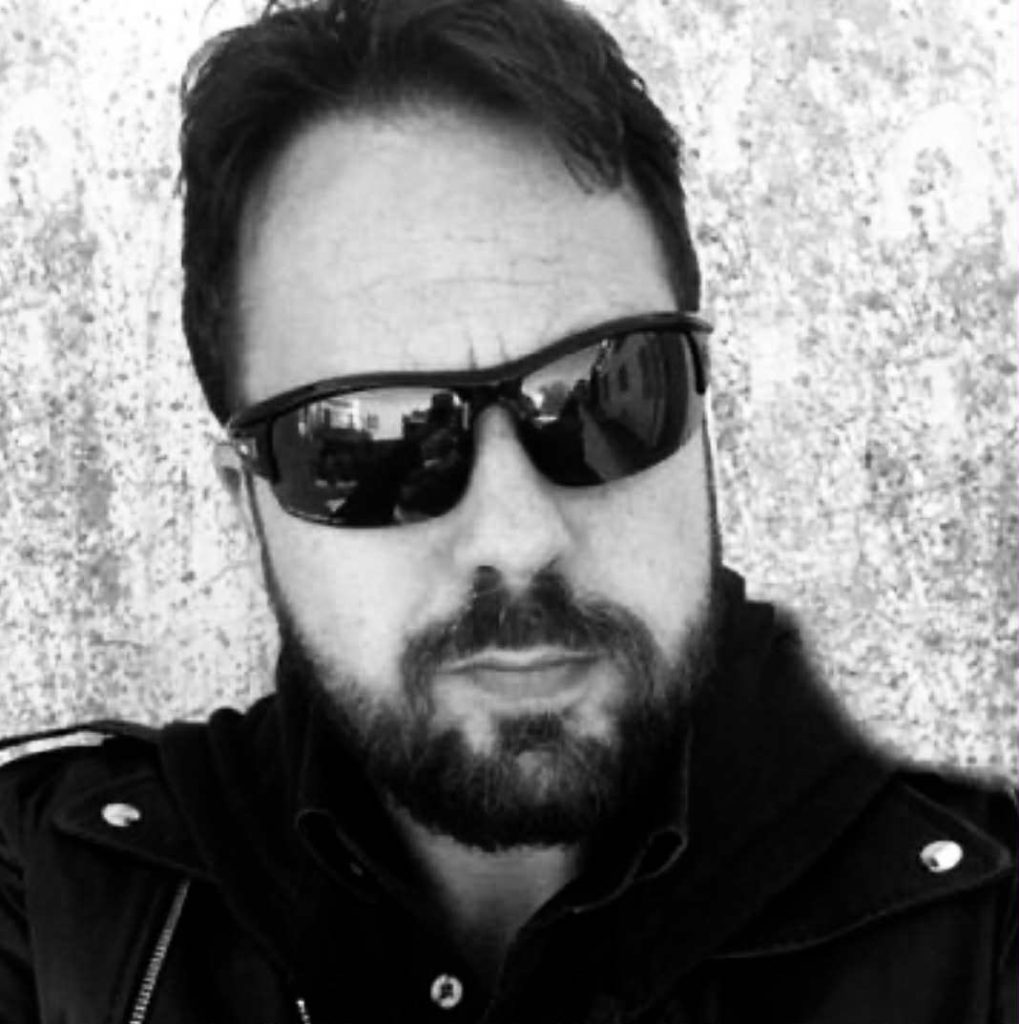
Among the main events taking place alongside the Venice Film Festival, there will be the presentation of the book PREDATOR – A Myth Between Sci-Fi and Anthropology at the Italian Pavilion, Hotel Excelsior, Sala Tropicana 2, on Wednesday, September 3rd at 10:00 AM.
Exclusively for WILD FILMMAKER, we are publishing an interview with one of the authors, Andrea Guglielmino.
-) Who is Andrea Guglielmino?
Well, that’s an easy one. I’ll answer with my semi-official bio:
Andrea Guglielmino defines himself more as a “writing person” than a writer. He moves across fiction, non-fiction, film criticism, and finally landed in his greatest passion—comics—in 2015, publishing his first story for Mostri by Bugs Comics. Since then, he’s continued working with Bugs (Samuel Stern), as well as Emmetre Edizioni (Garibaldi vs. Zombies, Garibaldi vs. Mickey, Garibaldi: Risorgimento, Garibaldi vs. Frankenstein) and Weird Book, with whom he published I Primi Cento—a tribute to Dylan Dog that earned him the Bartoli Prize for Best Writer at Cassino Fantastica in 2024.
He works for CinecittàNews, the official news portal of Cinecittà, and collaborates with several magazines, including Nocturno.

-) Tell us about your project “Predator – A Myth Between Sci-Fi and Anthropology.”
With pleasure! First of all, I’m happy to say it’s a finished and published project. It’s an essay co-written with my colleagues Gianmarco Bonelli and Guglielmo Favilla—yes, the actor! He’s also a very talented writer.
The book reinterprets the famous science fiction saga that started with the Arnold Schwarzenegger film, exploring it through a fresh socio-anthropological lens.
It’s a franchise that, beneath its genre surface and pure entertainment value, hides significant sociological and anthropological themes. These include ancestral myths rooted in the clash between nomadic and sedentary cultures, the tension between Nature and Culture, Magic and Technology, and even the caste-based structure of the alien Yautja society. Like any true Myth, Predator must evolve to reflect the society and historical context in which it appears.
It’s not your typical critical approach—we’re not interested in whether the films are “good” or “bad”—and it’s certainly not just a collection of facts, which, in the age of the internet, has little value.
The word “anthropology” shouldn’t scare anyone off. The book is very accessible even to readers unfamiliar with the subject—we provide all the necessary tools. It’s a playful book, not an academic one.
We don’t limit ourselves to the films, either. The Myth is analyzed across all forms: comics, novels, video games… everything we could get our hands on!
Plus, there’s a stunning cover by Giorgio Finamore and illustrations by top-tier artists throughout the book.
And three exclusive interviews: with John McTiernan and Stephen Hopkins (directors of the first two films), and with Chris Warner, creator of some of the comics.
It was published by Weird Book.
We’ll be presenting it at the Venice Film Festival, in the Italian Pavilion at Hotel Excelsior, Sala Tropicana 2, on September 3rd at 10:00 AM.
Everyone is, of course, invited!
-) Are you working on other projects?
As I mentioned, I’m also a comic writer and very active in that field. I’ve co-written a graphic novel with Omar Pedrini based on Viaggio senza Vento, the iconic album by Timoria. It’s set to be released this fall.
With Emmetre Edizioni, I’m working on the Garibaldiverso saga, which places characters from the Italian Risorgimento in confrontation with key figures from pop culture. It all started with Garibaldi vs. Zombies—we’re actually seeking collaborators and production partners to turn it into a film. It became a small but notable success in publishing. Then came Garibaldi vs. Mickey (taking advantage of Disney’s loss of rights to the first version of Mickey Mouse), Garibaldi vs. Frankenstein, and Garibaldi: Risorgimento (a tribute to The Crow). There’s a big surprise in store for Christmas… and I’m currently writing the spin-off Nino Bixio: Vampire Hunter.
Dioverso, co-written with Emiliano Pagani and illustrated by Nicola Perugini, had a “miraculous” crowdfunding campaign. And given its divine theme… and multiverse variants… it fits perfectly.
I’m also waiting for the green light from Bugs Comics (publishers of the Samuel Stern horror series) for a major project that I care deeply about.
Meanwhile, I’m continuing to promote I Primi Cento, a very unique comic essay about Dylan Dog—without Dylan Dog. It’s mostly about the obsession many fans have with the first 100 issues of the series. There are some exciting things in the works for that as well.
-) What do you think cinema will look like 100 years from now?
I honestly can’t imagine it… but I’m tempted to say the first hundred were probably better!
Jokes aside, you can’t ignore the impact of Artificial Intelligence and emerging technologies. Whether we like them or not, whether we choose to use them or not, you can’t stop the wind with your hands. I think it’s wiser to learn how to use them thoughtfully, rather than fight a pointless battle against the inevitable evolution of the world.

-) What would you change about today’s film industry?
It’s not really my job—I just write about movies and report news. And occasionally, I make up stories in comic form, which is an incredibly powerful medium, perhaps even more so than cinema. Mainly because the production effort is much smaller. Paper, pen, pencil… maybe a tablet—and with the same cost and manpower, you can create either a close-up of a character or an entire army charging across an alien world.
What I can share is a personal experience: I was stuck at home for a couple of years due to health reasons.
During that time, I reevaluated all the rhetoric around “you must see movies in theaters.”
The truth is: cinema must be watched—period. If it’s in a theater, great. But since we now have easy access to legal, quality streaming and digital platforms, rapid distribution of films should be a priority.
Back then, even if I wanted to, I couldn’t go to the cinema—and I can only imagine how many others deal with similar or even permanent limitations. I would have done anything for a legal link to see the films I was missing.
So yes, I’m in favor of shortening the release windows as much as possible. I think it could even help in the fight against piracy.
That’s just a user’s opinion—surely, people more knowledgeable than me will have stronger arguments. But since you asked: if I could change something, it would be the accessibility of content.
